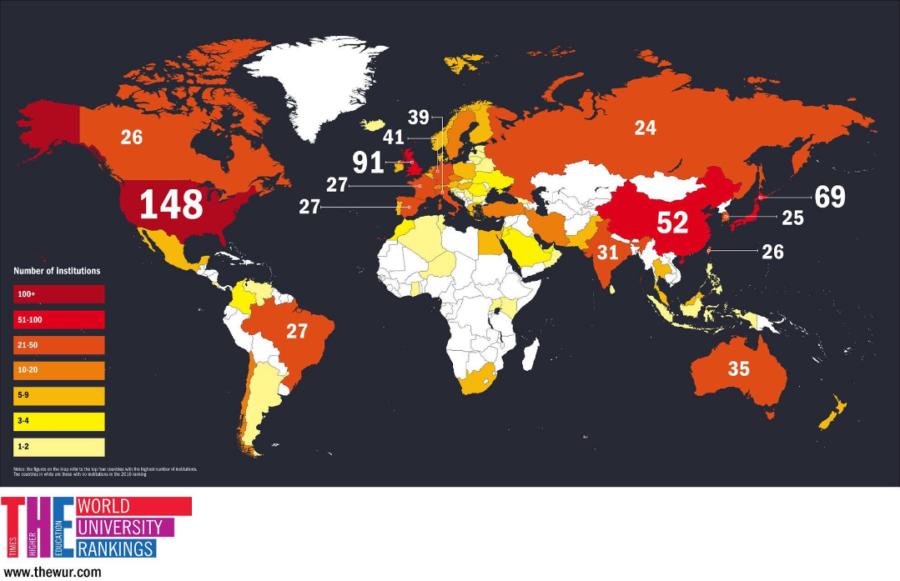24th October 2016 London, UK
UK universities are among the leading flag-bearers for Global Britain

It was obvious who was going to grab all the headlines. When Times Higher Education named the University of Oxford as the world’s number one university in September it was the first time the UK – indeed any institution outside the US – had taken the top spot in the World University Rankings since they were founded back in 2004. Oxford rightly attracted media attention right across the world.
This leading UK university, which has origins going back more than 800 years, has seen improvements across all the core performance indicators used to create the global rankings.
Notably, it has improved staff-to-student ratios, seen another successful year in attracting more international talent (among both academics and students) and managed to attract about 10 per cent more funding than in the previous year.
This ensured Oxford finished ahead of rivals such as Harvard, Stanford and Caltech in the US.
But Oxford’s headline-grabbing status as the new world number one university also highlights a remarkable, wider national success story – that the UK has one of the finest higher education systems in the world, with great strength in depth.
Of almost 1,000 institutions from 79 countries that Times Higher Education ranked for its 2016-17 World University Rankings, the UK has more representatives than any other country except the US.
Indeed, the UK came in with a remarkable 91 institutions on the list. This compares to just 52 universities for the emerging superpower of China, 41 for the European powerhouse of Germany, and 35 for one of the UK’s key competitors for international students, Australia.
And the UK took three of the world’s top ten positions (with Cambridge in 4th place and Imperial College London in 8th), seven of the top 50, and 32 of the top 200.
What is remarkable about the UK’s global ranking is that it encompasses many different types of institutions, from the ancients (Oxford and Cambridge), to the Victorian “red-brick” universities (Manchester, in 55th place, for example) to the 1960s “plate glass” universities (Warwick in 82nd) through to former polytechnics which became universities in 1992 (Anglia Ruskin, Plymouth and Oxford Brookes, for example). The UK has great strength in its diversity.
So what is driving the UK’s success?
The Times Higher Education World University Rankings are unique in that they look at the institution in the whole. We use a balanced and comprehensive range of 13 separate performance indicators spread right across the full range of a global university’s activities – teaching, research, international outlook and what we call knowledge transfer (looking at the contribution universities make to the “real world” of business and industry).
As well as great strength in teaching and research, an outstanding area for the UK is its “international outlook”. This indicator considers three crucial elements of a university’s performance: its ability to draw in international students, to attract international academics, and the proportion of its research published with international partners. And judged on “international outlook” alone, the UK has seven of the world’s top 25 institutions; as well as global powerhouses like Oxford and University College London, they include Essex University (18th in the world) and Queen’s University Belfast (25th)).
It’s no surprise that the UK universities have half a million international students, attracted by the depth and breadth of a teaching system that enables them to discover themselves through developing the critical thinking, creativity and confidence they need to succeed.
The 2016-17 Times Higher Education World University Rankings demonstrate powerfully that UK universities are among the leading flag-bearers for #GlobalBritain.
Phil Baty is Editor, Times Higher Education World University Rankings

The Conservative Government under Cameron and May have conspicuously tried to undermine the U.K. ‘S success with international students. They lump student visa holders into their immigration reduction targets. Pleas to stop this craziness have fallen on deaf ears (open letter from Cambridge university to Cameron Government) . It seems no amount of rational, supported argument can turn people who are rabidly fixated.
I live and work in Vietnam; lately my friends (anecdotal) have, since the Brexit furore, switched plans to send their children to the U.K. to other countries. Since Cameron was elected , I believe the granting of student visas to young Vietnamese – a large demographic in Vietnam with high educational aspirations – has fallen. The damage done gets not a whisper of a mention in your piece – which nevertheless I feel heartened by!
Robert Travers
5 Belsyre Court
Oxford OX2 6HU